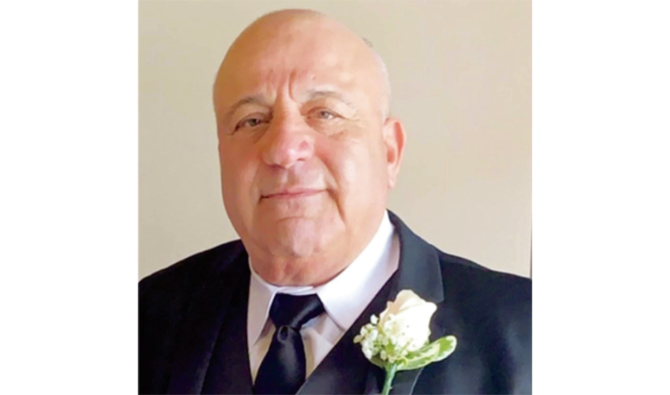CHICAGO: Jordanian American newspaper publisher Mansour Tadros, who died on Mar. 28 at the age of 70 after falling ill with a suspected case of COVID-19, was buried on Tuesday.
His funeral was unusual, given the precautionary measures to slow the spread of the pandemic. Only close family could attend a memorial service at Lawn Funeral Home in Tinley Park, Illinois. Restrictions imposed by the state’s governor, J. B. Pritzker, meant that other friends, relatives and mourners had to wait outside in their cars.
After the service, more than 70 vehicles formed a funeral procession that drove past Tadros’s home and on to Holy Sepulchre Cemetery in Worth, the final resting place of many of Chicago’s Christian Arabs.
The interment ceremony was likewise limited to immediate family, a priest and employees of the funeral home, all wearing face masks.
When the service was completed, the family members got into their cars and the other mourners paid their final respects by driving slowly past. Tadros’s sons, Fadi and Faris, acknowledged them from inside their car.
“We are so grateful to everyone who attended,” said Mansour’s sobbing wife, Lidya, who sat in a car with her daughter, Nadine, as the mourners went by, offering their condolences. “This is so difficult for us.”
Tadros, a cofounder of the National Arab American Journalists Association, was a giant in the Arab American journalism community. According to NAAJA, the Arab American and Muslim print media in America was badly affected by the 9/11 terrorist attacks in 2001, with many Arab ethnic and Muslim publications forced to close due to discrimination.
This prompted Tadros to launch The Future News in 2002. He advocated for more to be done to educate Americans about the true face of Arab culture, and highlight the fact that it is rich, diverse and embedded in the foundations of many great achievements of mankind, including science, math and language.
However, it was a struggle to keep his newspaper financially afloat and he often paid the publication costs out of his own pocket. Last year he shifted the operation to online-only.
One of his priorities was to make The Future News the “newspaper of record” for Chicago’s Arab American community, which began to settle in the city following the 1893 World’s Fair.
Tadros and his parents immigrated to the US in 1968 from Na’ur, a suburb of Amman in Jordan. He was very active in the Jordanian American and Palestinian American communities. Many of those who knew and worked with him paid tribute to his life and work.
“Mansour was a man that lived and worked constantly on behalf of our Arab American community,” said Nemer Ziyad, CEO of Ziyad Brothers Importing, “That was his life and that will be his legacy.
“He had no boundaries, no matter where in the Arab world someone was from, nor what religion they were. He was always about the community and always on the front line with any situation, even financially.”
he added that Tadros was “constantly helping people and families,” often dipping into his own resources and funds to do so.
“He was always helping people in need,” Ziyad said. “Mansour was an iconic man. He was respected in our community and by many others for his work. And he was loved by all he touched. He will be missed. His passing is a major loss to our community and society. He will never be forgotten.”
Marie Newman, who recently unseated incumbent Dan Lipinski in the Democratic Primary for Illinois’s 3rd Congressional District, recalled how he had helped and advised her.
“I am heartbroken about Mansour,” she said. “He was a great counselor and mentor to me. I will miss our long conversations. This a huge loss for all.”
The Future News endorsed Newman in the hotly contested congressional race. After her victory, Tadros predicted she would be a champion of civil rights for all residents, including Arab Americans.
St. Mary’s Orthodox Church Pastor Malek Rihani described Tadros as a man of faith.
“I’ve had the pleasure of working with Mansour a few times, and his focus has always been finding ways to strengthen our community by giving us a voice through his gift of journalism,” he said.
Tadros also worked closely with the Arab American Democratic Club (. Its chairman, Samir Khalil, said: “I knew Mansour and his parents and siblings for 50 years. I talked to him on the phone the night before his passing; he was in good spirits talking about Marie Newman winning, how happy he was and looking forward to helping unite the community.
“Mansour and I were active in college together as he was my schoolmate, and we kept working together, supporting each other to support the community for the past 50 years, on many occasions. I wish all activists in our community were like Mansour. If he disagreed with you, he always remained your loyal friend, with class.
“I loved him and loved the way he operated: very supportive, genuine, sincere and he got things done.”
Activists and former newspaper publishers Abder and Amani Ghouleh also paid tribute.
“Mansour was a man who was always there for the Arab American community,” they said. “He consistently volunteered his time, funds and advice to help many causes.
“His compassion and love for others was there to the very end, as he checked on many of his friends during this difficult time in the world. It was our honor to serve with him on...many ad hoc activist committees, as well as being his colleagues in local community journalism.”
Former Cook County Illinois Judge William Haddad described Tadros as a “great community leader.”
“The Arab-American community has lost a great friend. Mansour was a leader, an activist, a journalist and a man who loved his heritage and defended it I knew him as a colleague who worked with us not for himself, but for our people.”



























